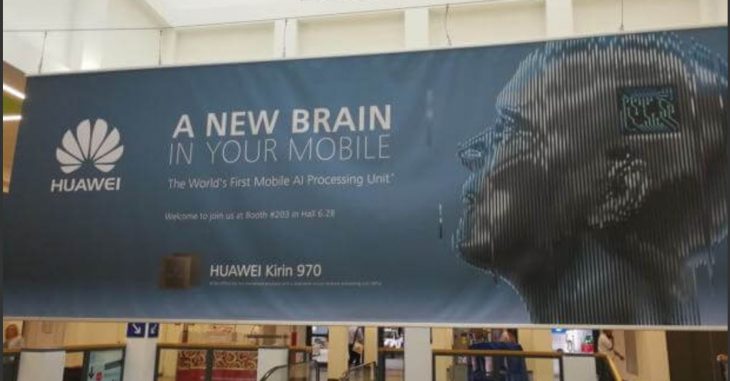
Saturday morning we reported on the new AI hardware that Huawei were expected to announce in conjunction with their new mobile chipset. This evening Huawei CEO Richard Yu took the wraps off what they believe will be a new era in smartphone innovation, native artificial intelligence (AI) processing.
As part of his keynote address Mr Yu revealed Huawei’s vision for future AI applications alongside the launch of their new chipset the Kirin 970. The Kirin 970 leverages cloud computing along with their new AI processing onboard the device with an aim to change the way we use our devices. Mr Yu emphasised Huawei’s dedication to future AI development and said:
As we look to the future of smartphones, we’re at the threshold of an exciting new era. Mobile AI = On-Device AI + Cloud AI. Huawei is committed to developing smart devices into intelligent devices by building end-to-end capabilities that support coordinated development of chips, devices, and the cloud. The ultimate goal is to provide a significantly better user experience. The Kirin 970 is the first in a series of new advances that will bring powerful AI features to our devices and take them beyond the competition.
We at #Huawei believe people want a device that can understand and predict their needs in an innately human way. #Kirin970 #HuaweiMobileAI pic.twitter.com/LU6WGBG7hn
— Huawei Mobile (@HuaweiMobile) September 2, 2017
Most AI these days involves Cloud AI but Huawei say that this can be improved with the addition of on-device AI. The two complement each other leading to an improvement in latency, stability and privacy. The on-device AI is designed to take advantage of the device’s own dedicated Neural Processing Unit (NPU) resulting in much faster real-time assistance. Combined with the cloud it is expect that the two will become much better are predicting a person’s needs and providing them as required.
The Kirin 970 chipset is Huawei’s new flagship chip and it is no surprise that we will be seeing it in the upcoming Mate 10. The octacore CPU chipset is built using an advanced 10nm manufacturing process and also contains a 12 core GPU. The result is that the Kirin 970 can perform tasks faster while at the same time using less power.
Unlock your full potential with #HuaweiMate10, powered by #Kirin970. Coming soon… #HuaweiMobileAI #IFA2017 pic.twitter.com/WoiPWoldhn
— Huawei Mobile (@HuaweiMobile) September 2, 2017
Another interesting portion on Mr Yu’s keynote was the mention of Huawei “positioning the Kirin 970 as an open platform for mobile AI”. It was combined with mention of the joint effort that the development of the chip was.
The Huawei CEO then mentioned Huawei “opening up the chipset to developers and partners” for them to find new uses for it. Via their new Kirin970 development kit they are allowing apps to access the NPU directly — hopefully this will lead to a lot of development in the AI scene but unless many more phones use this same architecture we find it hard to see it taking hold — although we hope it does.
We've built an open AI ecosystem, so apps can access NPU capabilities directly and via 3rd party AI frameworks. #HuaweiMobileAI #IFA2017 pic.twitter.com/SSWrPkwr0P
— Huawei Mobile (@HuaweiMobile) September 2, 2017
Our open mobile #AI platform with #Kirin970 development kit, website and app store, allows you to get creative. #HuaweiMobileAI #IFA2017 pic.twitter.com/Eq6juhz1Oj
— Huawei Mobile (@HuaweiMobile) September 2, 2017
Our intelligent photography helps you capture great shots by auto-selecting settings based on object and scene recognition. #HuaweiMobileAI pic.twitter.com/11uyZfgKoB
— Huawei Mobile (@HuaweiMobile) September 2, 2017
With their presentation today Huawei have fired a shot across the bow of Qualcomm and may have just kick-started the next generation of AI. We can’t wait to see what this chipset and it’s AI NPU can do IRL also what Qualcomm do in response to this innovation.
Would this new advancement to AI make you consider a Huawei Kirin-970-toting device for your next?






Huawei, the company that absolutely refuses to update handsets in Australia. Love the camera on my P9, would’ve loved the P10+ but can’t trust Huawei AU to provide even security updates (the P9 still stuck on Sep 2016). They could be a great handset manufacturer however they don’t yet understand (or seem to care) that mobiles with cutting edge features (eg. AI) are bought by tech people first and tech people expect timely updates. Non-tech people know Apple or Samsung when it comes to flagships, they don’t know Huawei and if non-techies ask their techy friends they are going to… Read more »
Huawei is a great brand. Even most do not recognize this brand, it is performing well.
That reminds me of last Google IO where Google talked about phones with TensorFlow Processors as a possible future.